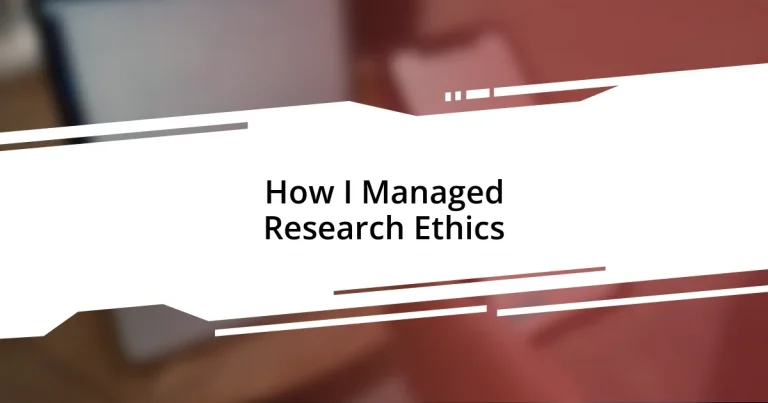Key takeaways:
- Research ethics crucially balances the pursuit of knowledge with the moral responsibility towards human participants, emphasizing consent and transparency.
- Ethical guidelines protect participant welfare, ensure fairness, and enhance the credibility of research findings.
- Common ethical issues include informed consent, data integrity, and sensitivity towards vulnerable populations, necessitating ongoing ethical reflection throughout the research process.
- Maintaining confidentiality and creating a safe environment for participants are vital for fostering trust and ensuring authentic data collection.
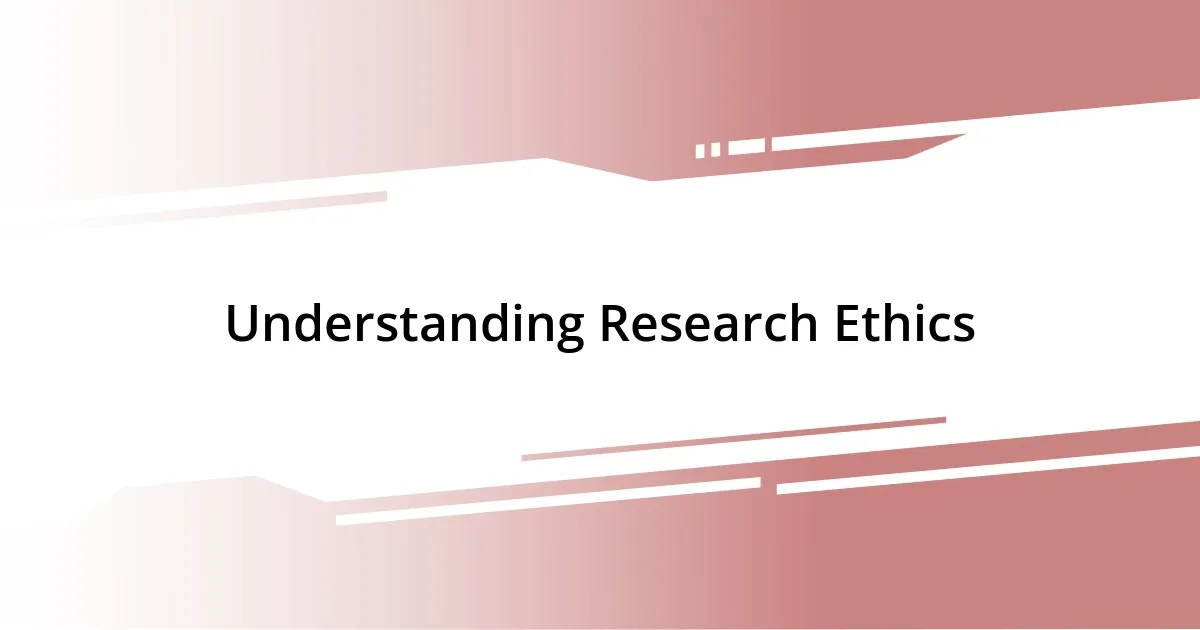
Understanding Research Ethics
When I first encountered the term “research ethics,” it felt overwhelming. I wondered, “How can one balance the pursuit of knowledge with moral responsibility?” My early experiences in research opened my eyes to the profound importance of ethical considerations, especially when working with human participants. I learned that every decision we make can impact lives, a realization that adds a heavy weight to our responsibilities as researchers.
One vivid memory stands out: a project involving interviews with vulnerable populations. I was anxious about whether I could truly ensure their privacy and comfort. This situation highlighted that ethics isn’t just about following rules; it’s about being genuinely concerned for the welfare of those involved. With each interaction, I focused on consent and transparency, which not only fostered trust but also deepened my understanding of ethical research practices.
Reflecting on these experiences, I often ask myself, “What if I hadn’t prioritized ethics in my work?” The thought alone emphasizes how critical it is to weave ethical considerations into the very fabric of our research designs. Understanding research ethics is not just a guideline; it’s a commitment to integrity and respect for everyone impacted by our inquiry.
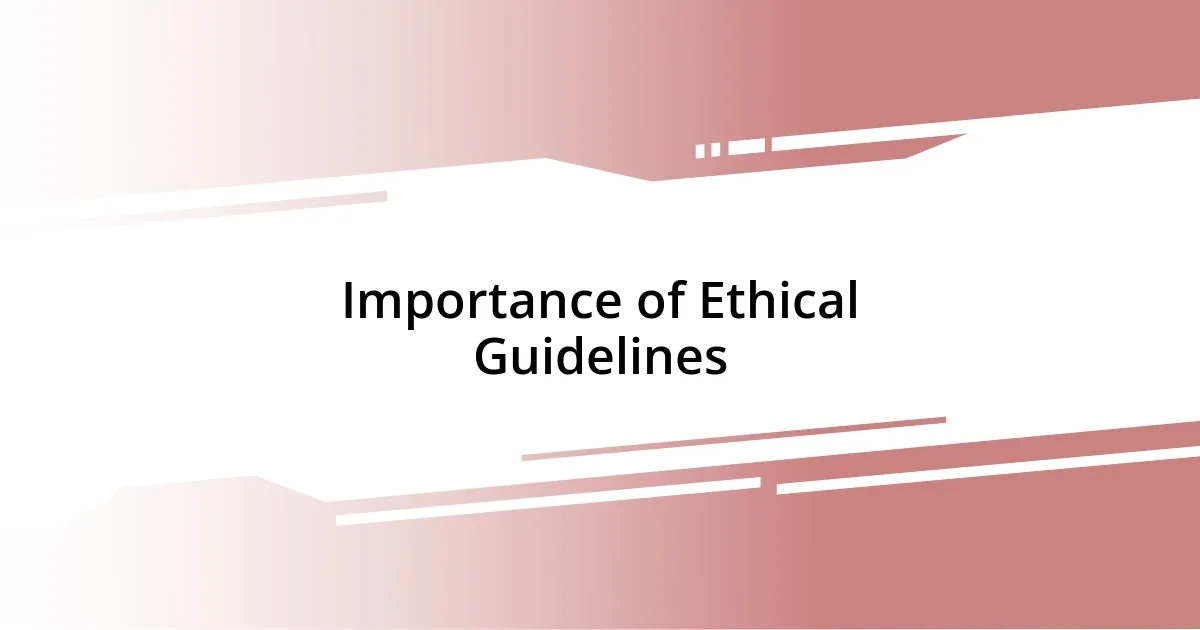
Importance of Ethical Guidelines
Ethical guidelines serve as the backbone of responsible research, offering a framework to protect participants and guide the researcher’s conduct. I remember a particularly challenging project that involved collecting sensitive data from a community hit by a crisis. Without strict ethical guidelines, I might have sacrificed participant safety for potentially valuable information. Yet, it was precisely those guidelines that reminded me of my duty: to be a guardian of trust.
- They promote fairness, ensuring that all voices are heard and considered.
- They safeguard participants from harm, both physical and emotional.
- They enhance the credibility of research, making findings more trustworthy and reputable.
- They foster a culture of accountability, reinforcing the ethical obligation researchers have towards their subjects.
I truly believe these principles are not mere formalities; they shape the researcher’s integrity and the quality of their work. Every time I consider the devastating impact a breach of ethics can have, I’m reminded of my role as a steward of my research community.
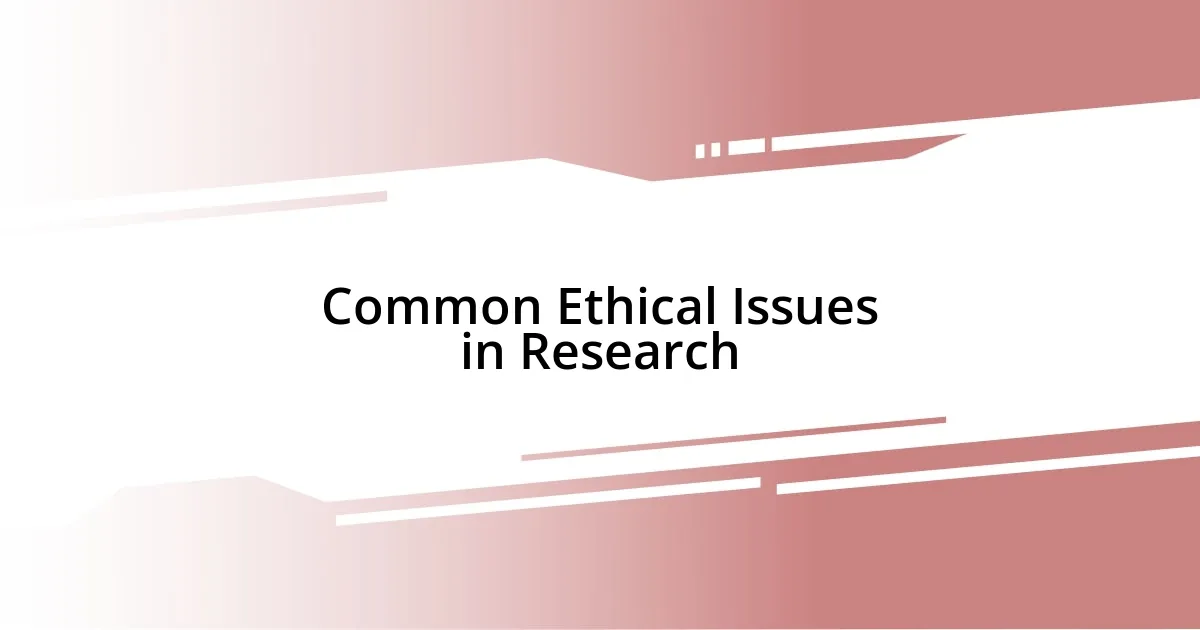
Common Ethical Issues in Research
Common ethical issues in research can often be subtle yet profoundly impactful. For instance, I recall a moment during a study where I struggled with the concept of informed consent. In one particular instance, I was interviewing participants who had unique insights but were hesitant to share due to their past experiences. This made me reflect on the delicate balance between gaining rich data and ensuring they felt safe and respected—a dilemma that many researchers encounter.
Another common challenge is the issue of data integrity. I’ve faced instances where the pressure to produce compelling results tempted me to overlook certain discrepancies. I learned the hard way that falsifying or manipulating data not only undermines the entire research process but also damages the trustworthiness of the scientific community as a whole. It’s a stark reminder that integrity must be at the core of any research endeavor.
Moreover, researchers often navigate ethical dilemmas concerning vulnerable populations. I remember working on a project involving disenfranchised groups. It was crucial for me to consider their voices genuinely and advocate for their rights throughout the research process. This sensitivity to power dynamics is something every researcher needs to cultivate, as it can profoundly affect the outcomes and the participants’ experiences.
| Ethical Issue | Impact |
|---|---|
| Informed Consent | Ensures participants fully understand and agree to the research, fostering trust. |
| Data Integrity | Maintains the quality and credibility of research findings. |
| Vulnerable Populations | Safeguards the rights and welfare of those who might be exploited. |
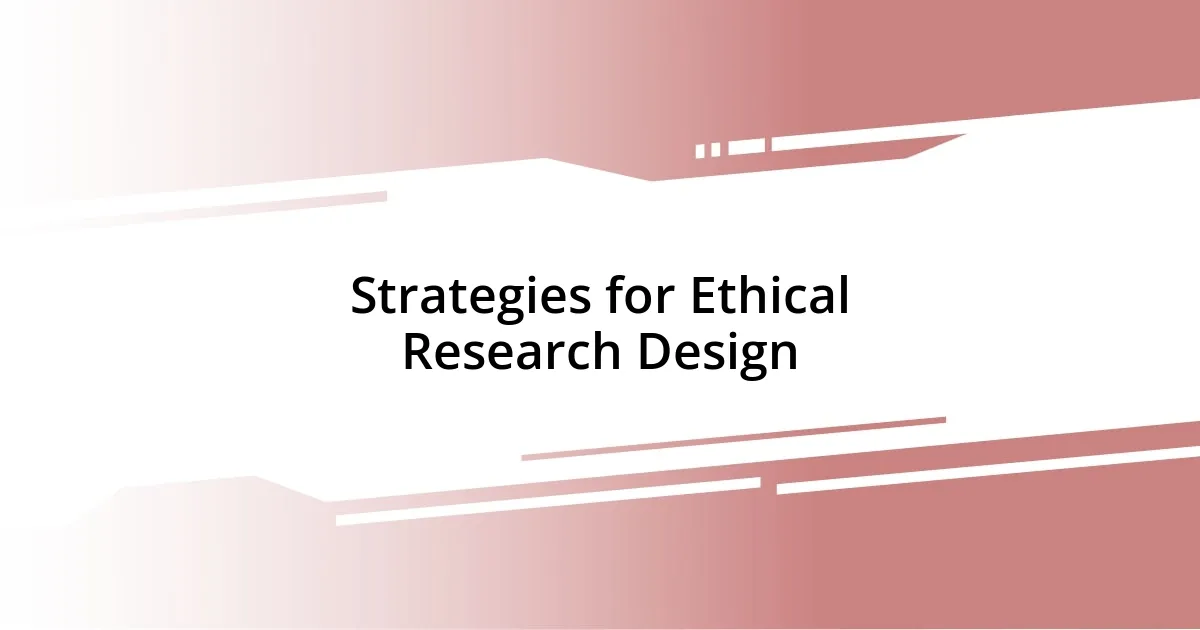
Strategies for Ethical Research Design
One effective strategy for ethical research design is to actively involve participants in the research process. I once conducted a workshop where participants could shape the research questions based on their experiences. This not only empowered them but also provided insights that I wouldn’t have considered otherwise. Isn’t it fascinating how involving participants can lead to richer data and greater ethical sensitivity?
Another approach that I’ve found invaluable is conducting thorough ethical training for researchers involved in the project. In my earlier days, I underestimated the importance of this until I witnessed a colleague mishandle a participant’s sensitive information. That experience taught me that knowledge about ethical standards is not just a checkbox; it’s essential for fostering a culture of respect and accountability. How can we expect to navigate complex ethical situations without a solid grounding in fundamental principles?
Lastly, I advocate for ongoing ethical reflection throughout the research process. After a particularly challenging study, I instituted regular check-ins with my team to discuss emerging ethical concerns as they arose. This practice nurtured a safe environment for voicing anxieties and dilemmas. Have you considered how continuous ethical dialogue can strengthen the integrity of your research? By making ethics an ongoing conversation, we create a community that prioritizes participant welfare above all.
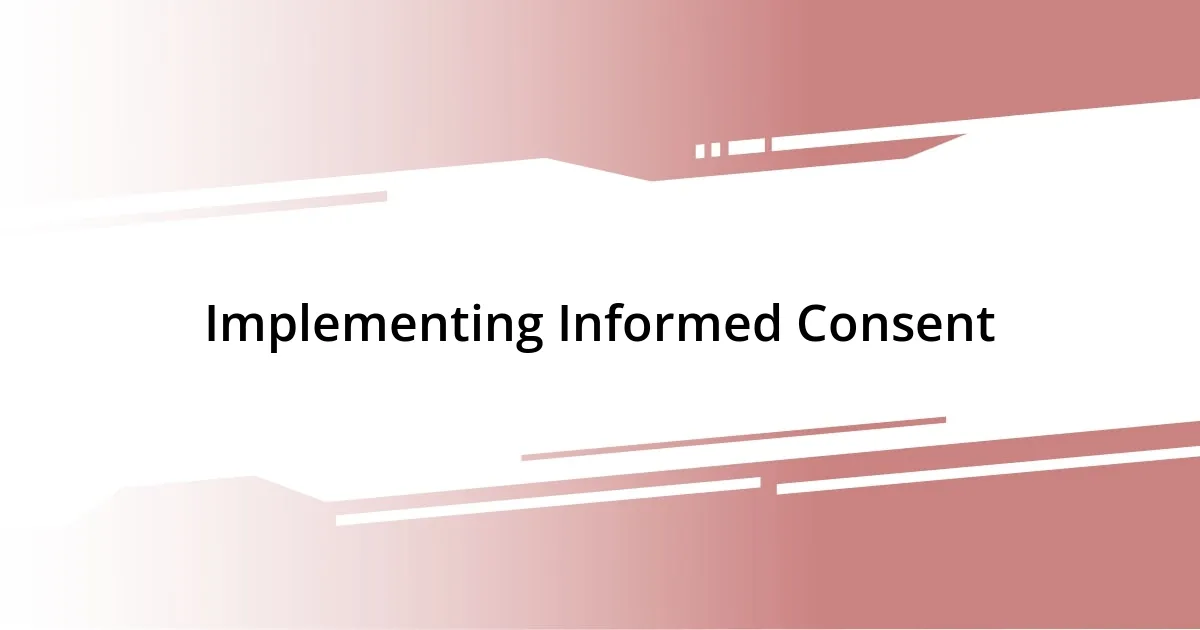
Implementing Informed Consent
Implementing informed consent is essential to establishing a trusting relationship with participants. I vividly remember a particular focus group session where I took extra time explaining the research goals and what participation entailed. By encouraging participants to ask questions, I could see that their apprehension melted away, revealing a willingness to share their thoughts and experiences. Isn’t it remarkable how a transparent conversation can transform the atmosphere from anxiety to openness?
On another occasion, I encountered a situation that reinforced my commitment to informed consent. I was working with a group of individuals who had faced significant trauma. Providing them with a clear outline of how their data would be used was paramount. I encouraged them to voice any hesitations, and one participant shared their concern about anonymity. This feedback prompted me to modify my approach, ensuring that everyone felt secure. Have you ever considered how participants’ comfort levels can influence the quality of the data you collect?
I’ve learned that informed consent is not a one-time event but an ongoing dialogue. During my research on mental health, I made it a point to revisit the consent process throughout the study. After every interaction, I’d check in with participants to reaffirm their comfort by allowing them to withdraw if they wished. This not only solidified trust, but it also provided valuable insights into their evolving perspectives. How do you ensure that informed consent remains a living process in your own research endeavors?
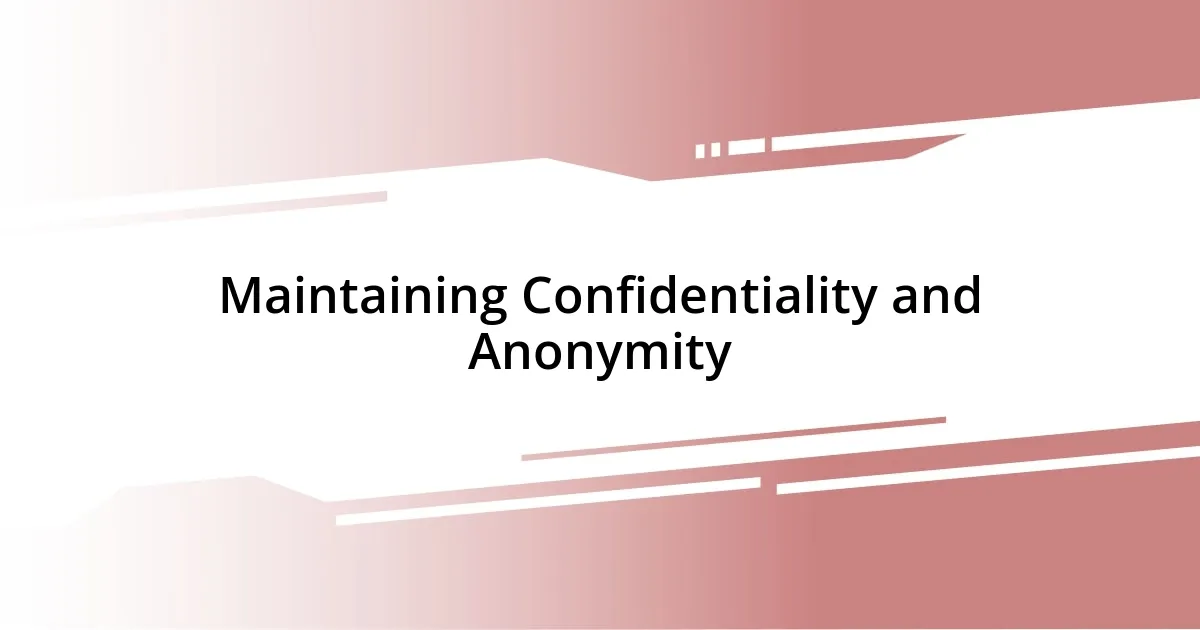
Maintaining Confidentiality and Anonymity
Maintaining confidentiality and anonymity is a cornerstone of ethical research, and I’ve learned this lesson through hard experiences. Once, during a study on community health, I inadvertently revealed a participant’s identity while discussing my findings. The embarrassment I felt was palpable, and it reminded me of the weight of ethical responsibility. Have you ever realized just how fragile participant trust can be? That moment galvanized me to implement stricter data handling protocols.
I vividly recall working with a vulnerable population and the immense pressure I felt to protect their identities. During data collection, we used pseudonyms and removed identifying details to ensure anonymity. It was fascinating how this simple act of safeguarding their information empowered them to speak more freely. Have you considered how a secure environment can significantly influence the authenticity of your research outcomes?
In my current research practices, I emphasize the importance of secure storage solutions for data. After transitioning from physical files to a digital format, I ensured that all sensitive information is encrypted and accessible only to authorized personnel. I can’t stress enough how important it feels to know that I’m safeguarding my participants’ stories. It’s a profound responsibility I carry, as I think about how each data point holds a personal narrative. How do you approach the challenge of protecting the stories of those who share their lives with you?
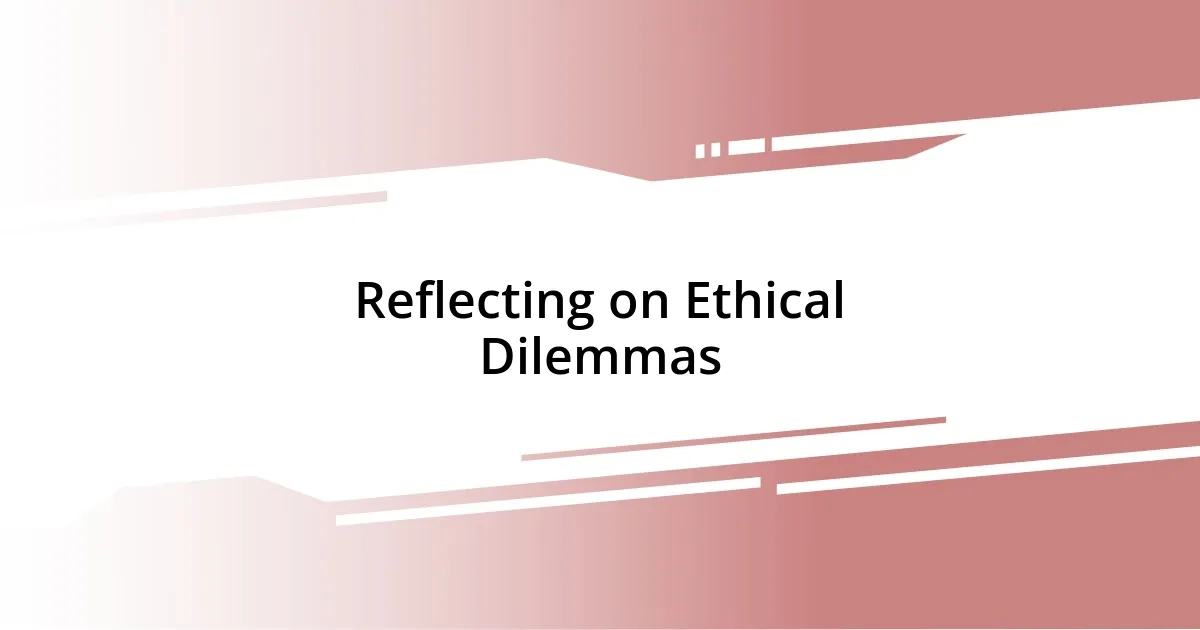
Reflecting on Ethical Dilemmas
Reflecting on ethical dilemmas in research often brings up poignant memories for me—moments where I had to balance the pursuit of knowledge with respect for participant dignity. I once faced a dilemma regarding the extent of probing required in interviews. I distinctly recall sitting across from a participant who had endured a particularly sensitive experience. As I considered pushing deeper for richer data, I felt a nagging sense of discomfort. Was it worth risking their well-being for the sake of my research outcomes? That self-reflection led me to realize that sometimes, what’s most important is not the data, but the human experience.
Another time, during a project exploring sensitive topics, I encountered a participant who clearly wanted to share but was visibly distressed. I had to decide quickly whether to redirect the conversation or allow their emotions to unfold. In that moment, I recognized that ethical research requires being attuned not just to the information sought but also to the emotional landscape of those involved. This realization has profoundly shaped how I approach my research. Have you ever had to weigh the immediate needs of participants against the demands of your research goals?
In grappling with these dilemmas, I’ve learned the importance of cultivating an environment where participants feel safe to express themselves. There was an instance when a participant hesitated to share a critical piece of their story due to fear of judgment. It struck me then that I needed to foster an atmosphere of trust. By sharing my own experiences of vulnerability, I found that participants were more willing to open up. It’s a delicate balance, isn’t it? The ethical path often requires us to navigate our own insecurities while prioritizing the voices of those we study. How do you create that safe space in your research endeavors?












